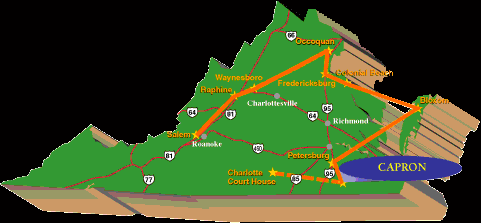
Download
in PDF Format
Driving down U.S. 58 from nearby
Emporia on the way to tiny Capron, Virginia (population 162), in
Southampton County, travelers pass field after field of farmland. This is
peanut, soybean, and cotton country, with thousands of acres bursting with
such crops. Capron�s Main Street lies just off Route 58, a bustling
four-lane highway filled with tractor-trailers and travelers bound for
somewhere else.
|

Capron's
Main Street boasts a collection of well-kept homes with manicured
yards. |
Travelers venturing into Capron today
will find a town where freight trains still pass daily, anchored by J.T.
Barham & Company�s store, and boasting a collection of tidy houses
with manicured lawns and front-porch swings. There�s also the Capron
Post Office, the Capron Town Office, the Bank of Southside Virginia, the
Capron Volunteer Fire Department and several churches. Out on �the
highway� (U.S. 58), as locals call it, there�s Pope�s Citgo Slip In
store and gas station and, on the other side of U.S. 58 on Main Street,
Porky�s Barbecue restaurant.
Natives like Ira �Pete� Barham,
80, who served as Capron�s mayor in 1960-�62 and again from 1966 until
his retirement in 2006, remember a bustling Capron of yesteryear.
�I grew up when the town had dirt
roads. We had 12 stores and two blacksmith shops before World War II,�
Barham recalls. �This was a thriving little town in the 1930s, with a
train depot where passenger trains came through four times a day, a box
mill, a hotel and a livery stable where the firehouse is now.
�People didn�t have electricity
here until 1939. We didn�t have a refrigerator in our house until World
War II,� he adds. �When I grew up we had wood heat and chickens in the
yard. We had to milk three to five cows twice a day, and I delivered milk
by bike [on my bicycle].�
|
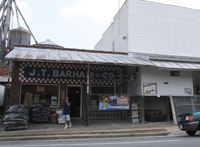
Barham
and his son and grandson own and operate J.T. Barham & Co.,
the community's anchor business. |
Today J.T. Barham & Company
continues to be operated by Barham, his son Ira Thomas �Tommy� Barham
and grandson Christopher Barham. Pete Barham attended Virginia Polytechnic
Institute & State University for one semester before volunteering for
submarine training and a 28-month stint in the U.S. Navy from 1944-�46.
He came home planning to return to college when his father�s heart
attack changed his plans.
�I couldn�t leave him with the
responsibility [of the store],� Barham recalls. �He died at age 58 in
1949 and left me the store and $4,000 in cash � not really a lot to run
a business.�
|
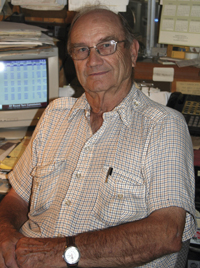
Native
Pete Barham was Capron's mayor for more than 40 years. |
He doesn�t know when the store,
founded by his grandfather, J.T. Barham, opened, but says a customer once
brought in a bill of sale from the store dated 1835. Although the store
still operates, complete with a vintage 1912 cash register, it has evolved
into a business that sells fertilizer, seed, chemicals, farm supplies and
also buys grain.
On a warm day, Moses Wyche takes a
break and sits on the store�s gray concrete front steps. Wyche, 64, the
recently elected Capron District representative on the Southampton County
Board of Supervisors, has worked at Barham�s for 45 years.
�This is God�s part of the
world,� Wyche says of Capron. �I feel fortunate to have been born and
raised here.�
He adds, �I went to New York City
for three months after I graduated from high school here in 1961. I came
back to help Dad, a farmer, get his crop in ... the guy here at the store
had quit, and Mr. Barham got me out of the fields and told me I had a job
here if I wanted. I�ve been here ever since. I didn�t like the fast
life. I like the country.�
|
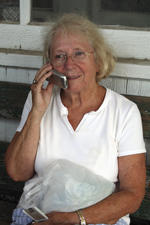
Betty
Banty moved to Capron when she married a local. |
J.T. Barham bookkeeper Betty Banty
moved to Capron when she married a local. She calls Capron �a nice
little laid-back town with a lot of new people moving in.� One such
newcomer is Maureen Shelly, who moved to Capron over four years ago to get
away from the city.
�When I came here, Moses [Wyche]
said �If you need anything or need to know anything, ask me� ...
it�s true, if you need a notary, or whatever, ask him,� Shelly says.
�I grew up in a rural area. I immediately felt welcomed here.�
Capron was first settled in 1888 when
the Danville/Atlantic (later Southern) Railroad was constructed. The
earliest days of Capron revolved around sawmills, logging and the
railroad.
The first building constructed in
Capron was today�s now-crumbling train depot. Originally named
Princeton, in honor of railroad vice-president Judge Prince of nearby
Courtland, Virginia, in 1890 the town�s name was changed to Capron,
after Southern Railroad�s general freight and passenger agent. The name
change came after postal authorities requested it, citing mail-handling
confusion caused by the post office having the same name as Princeton,
West Virginia.
Ginger Smith, 34, officer-in-charge at
Capron Post Office, notes that about 150 of the town�s 360 post office
boxes are full, a good indication of town population. The Capron zip code
actually includes 391 boxes, including rural mail delivery spanning a
92-mile radius.
Smith, married to local farmer Stuart
Smith and mother to two boys, moved from Dinwiddie County nine years ago.
She lives with her family on the �homeplace� where her husband grew
up, and says, �It�s wonderful here. I like a small town, where
everyone knows everyone. It�s more like a family than a small town.�
Town residents commute to jobs at the
local prison system, at International Paper or Hercules chemical company
in Franklin, or to jobs in the Tidewater area.
|
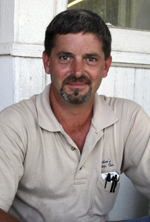
Nick
Kitchen moved to Capron 16 years ago from Courtland after finding
a house he liked on Capron's Main Street. |
Mayor Nick Kitchen moved to Capron 16
years ago from Courtland after finding a house he liked on Capron�s Main
Street.
�I found people here are pretty much
like people in the rest of the county. I have always felt welcome, and the
small-town atmosphere where you can trust your neighbors has kept me
here,� he says.
Kitchen, 43, is vice-president of
Kitchen�s Welding Inc. and Kitchen�s Cranes Inc., a five-mile drive
away. Elected in July 2006, he says after Barham retired as mayor, people
approached him to run as a write-in candidate. Winning the election by one
vote, he oversees town finances and the municipal water system, noting
that the job �is really more involved than I anticipated.�
The biggest topic on everyone�s mind
is growth. Pete Barham thinks the town �will end up being a housing
development.
�I don�t see any hopes of any
[more] retail outlets in Capron,� he says. �People also don�t visit
each other like they used to ... there�s people here I don�t know, as
small as it is.�
Clarke Fox, who along with brother
Cliff Fox runs Foxhill Farms Inc., says Capron has been �discovered�
in the past five years.
�It started with people moving here
for 10-acre lots. Now they are building homes on 1-to-2-acre lots and our
[property] assessments have tripled in the past year alone,� Fox, 46,
explains. �The challenge for Capron is to keep it from becoming a ghost
town. The people moving in � will they want to keep it up? A lot of
people are just using it as a bedroom community.�
|
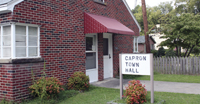
Capron
Town Hall |
Since landowners who lease land for
farming could get more money by selling for development, farmers are
understandably concerned. Land costs coupled with increased traffic make
farming even more of a challenge. People move for a rural lifestyle, then
complain about �tractor dust,� Fox says.
�And the traffic? Yesterday I had to
get a police escort to get my combine home,� he notes.
Clarke and Cliff Fox farm more than
2,000 acres spread out over 165 fields. They own about a third of the land
and lease other land to grow cotton, peanuts, corn and soybeans. In 2006
the farm was honored by the Southern Farm Press� High Cotton Award,
which recognizes land stewardship as well as high cotton production.
�Dad, who�s retired but still
helps us with farm operations, always told us you�re just caretakers of
the land while you are here on earth,� Fox says of their conservation
efforts.
|
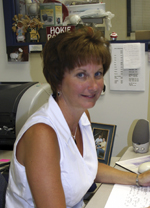
Jeannette
Everett is chairman of Community Electric Cooperative's board of
directors. |
Jeannette Everett, who works for the
county Commissioner of Revenue and is chairman of Community Electric
Cooperative�s board of directors, is also a farmer�s wife. Husband M.L.
Everett, Jr., grows soybeans, pumpkins, grains and cotton. She notes,
�We want to preserve our agricultural heritage, which is difficult in
these changing times.�
Sharon Painter, who opened Porky�s
Barbecue with her daughter in 2004, says Capron�s a good place to start
a mom-and-pop business.
�I love Main Street, where the
church bells ring at lunchtime and at 6 p.m.,� she says. �I cater to
farmers and hunters, and we have many people who get take-out meals. And
we get celebrities in Capron � last year David Hartman [former host of
ABC-TV�s Good Morning America show] came in on his way to Oceana with
his son.�
�The growth will eventually hit us
after awhile but I think we can hold on to our agricultural roots,�
Everett says. She likes to tell the story of a �come-here� who
complained at the county office about rising tax assessments.
�He said, �What do I get, for my
tax dollars?� � Everett recalls with a grin. �An employee answered
him, simply, �peace and quiet.� �